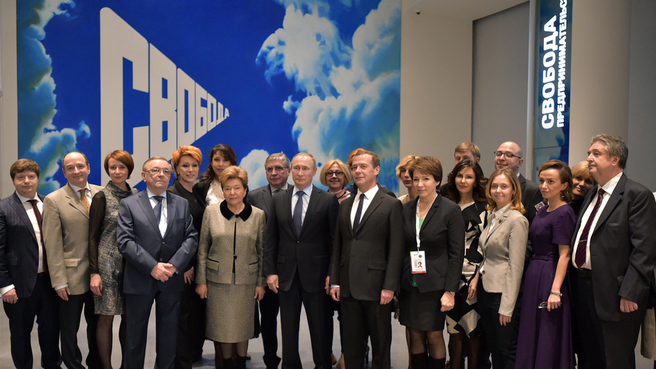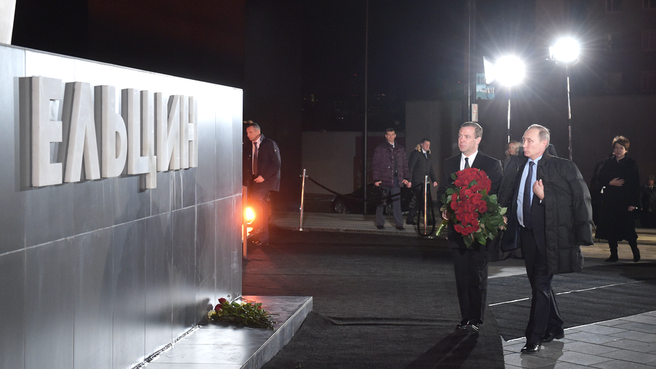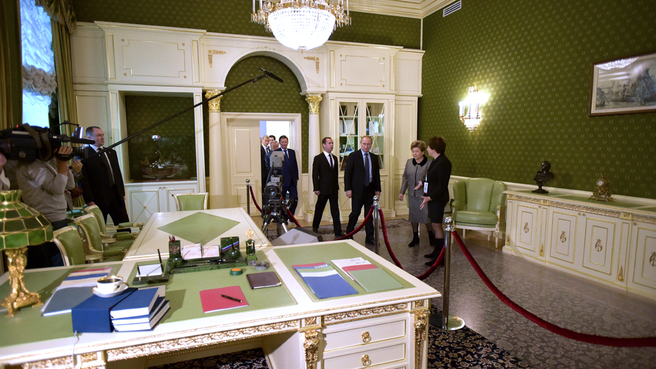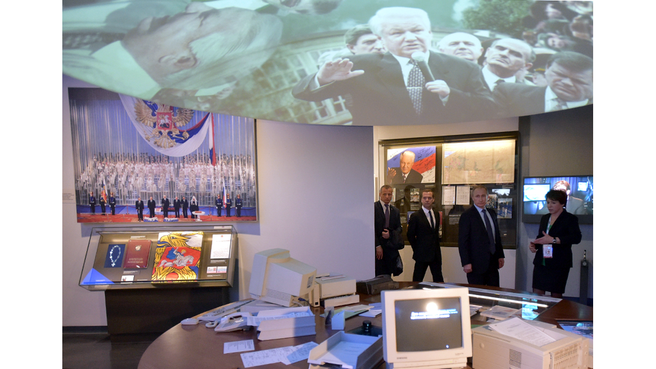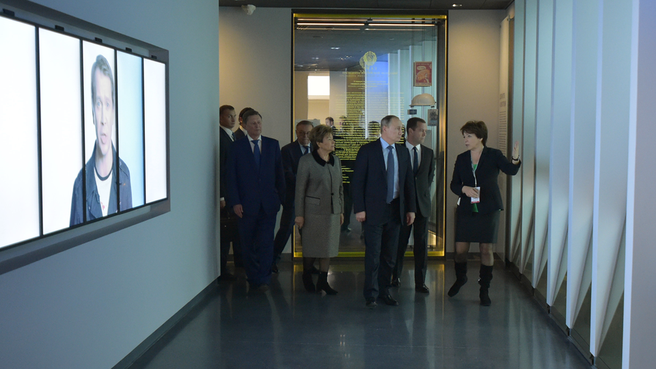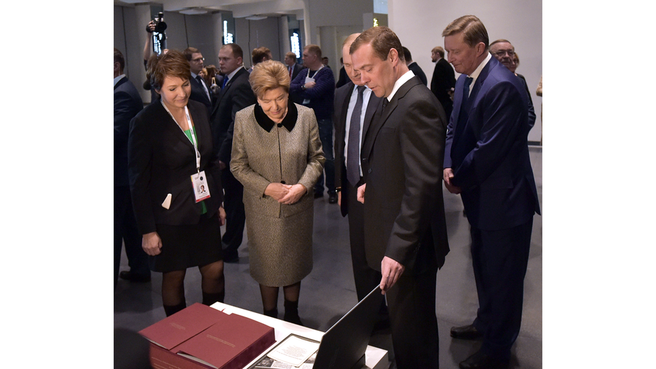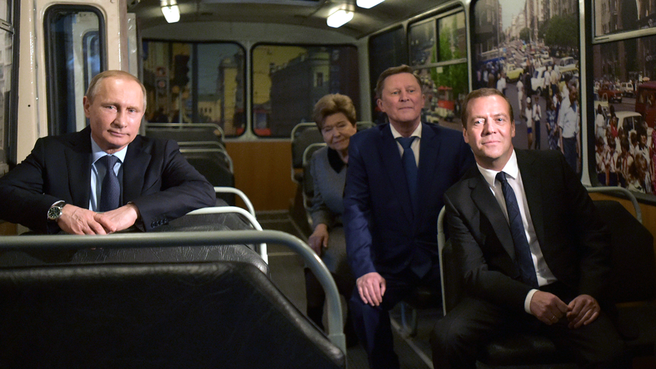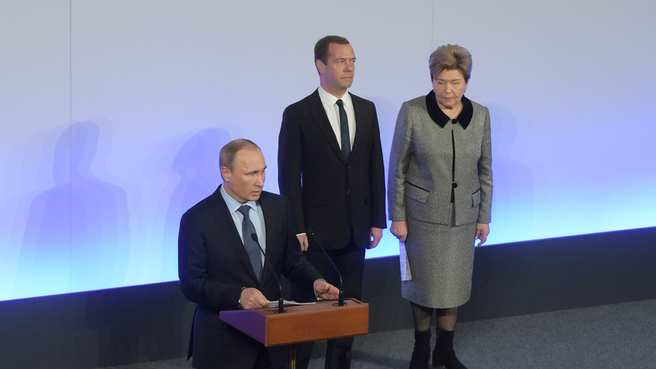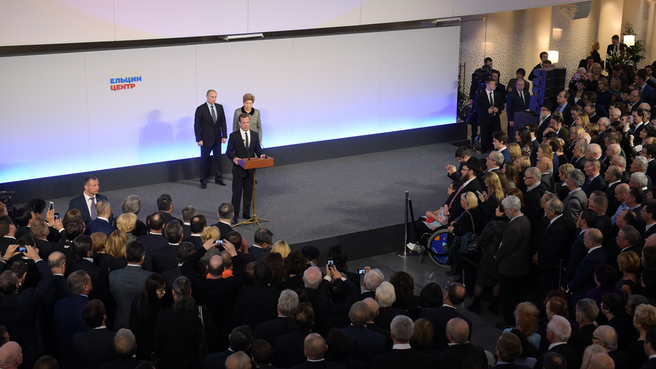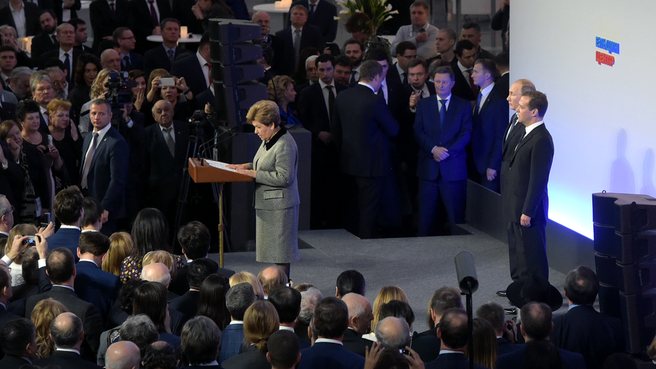President Vladimir Putin and Prime Minister Dmitry Medvedev attended the opening ceremony of the Boris Yeltsin Presidential Centre.
The Boris Yeltsin
Presidential Centre was established in accordance with the Federal Law No.
68-FZ, On Establishing Centres to Honour the Historical Legacy of Former
Russian Presidents, adopted on 13 May 2008.
The centre’s main purpose is to preserve, study and understand Boris Yeltsin’s historical legacy in the context of political and social events of the 1990s and the institution of the presidency in Russia.
The centre has a floor space of 88,000 square metres and houses a museum, a library, archives, education and children’s centres, and exhibition halls. The museum and the archives hold over 30,000 items and over 130,000 photographs. More than 130 interviews have been given and 163 media programmes have been prepared for the museum.
Museum exhibits include a hand-written letter from Boris Yeltsin to Mikhail Gorbachev criticising party bureaucracy; the white, blue and red tricolour that was raised over the Kremlin on 25 December 1991; and the first Russian President’s office, which has been moved from the 14th block in the Kremlin to the museum in its totality, from the writing table to the Presidential Standard.
The official website of the centre: http://www.yeltsin.ru/.
Dmitry Medvedev has presented an album titled, “Boris Yeltsin’s Visit to Leningrad, March 1991”, to the Boris Yeltsin Presidential Centre. The album contains copies of newspapers that covered Yeltsin’s visit and photographs of that period, as well as parts of a video recording of Chairman of the RSFSR Supreme Soviet Boris Yeltsin’s meeting with deputies of the Leningrad City Soviet and the full text of that speech. These documents were provided from the Central State Historical Archive of St Petersburg, the Presidential Library named after Boris Yeltsin, and the Kirov Plant’s archive.
The opening ceremony of the Boris Yeltsin Presidential Centre
Participants in the opening ceremony included Boris Yeltsin’s widow, Naina Yeltsina, and daughter, Tatyana Yumasheva, Chief of Staff of the Presidential Executive Office Sergei Ivanov, government representatives, foreign leaders who worked with Mr Yeltsin, members of his presidential team, politicians, cultural figures, relatives, and former fellow students.
Transcript:
Vladimir Putin: Mrs Yeltsina, ladies and gentlemen, friends,
Today, we are opening the Boris Yeltsin Centre.
This is more than simply a tribute to Russia’s First President. The centre was conceived as a place that would reflect an entire era in our history, a time of radical change, very important, difficult, and, of course, contradictory transformations.
We saw the exhibition just now. It really does tell the honest story of how modern Russia was built, the difficulties encountered on the way, and the problems that had to be solved. It is the story of all that was accomplished during this difficult period.
We are learning to objectively and carefully treat and respect our history and the centuries-long uninterrupted road our country has travelled. This road was full of great achievements, sharp turns, mistakes, and outstanding victories.
We need to know and study this difficult experience with its many aspects and dimensions, take pride in it, learn lessons from it, of course, and feel and understand its spiritual and moral significance.
The centre’s exhibition is an example of how we apply this attitude to what was one of the key stages in Russia’s development. It has collected and systemised a unique and very large quantity of documentary materials.
Boris Yeltsin’s own destiny and personality reflected in full the tremendous challenges, difficulties and contradictions of that time. He had a determined, direct and courageous character and the ability to be resolute to the limit. It was in large part thanks to these qualities of his that our country stayed on the democratic development track it had chosen.
It was then, at a time of intense political confrontation, that our country’s Constitution was adopted, forming the foundation and providing the clear provisions for beginning the constructive period of our development.
Boris Yeltsin had a deep understanding of the dramatic nature of the radical transformations taking place. He lived these changes himself in full, in his conscience, soul and heart, knew doubts and torments, and knew what tremendous difficulties our people had to go through. It was then that he took the decision to step down and, as we remember, addressed Russia’s people with sincere words, a genuine confession. In this, we see his strength, honesty and openness.
Mrs Yeltsina, you were at Boris Yeltsin’s side for more than 50 years and you earned the respect of millions here in Russia not just as the First President’s wife, but also as someone of great tact and strength. We feel your warmth and generous spirit here in this hall too.
I want to thank all of the Boris Yeltsin Foundation’s organisers and trustees for their active participation in establishing the centre. The Sverdlovsk Region and Yekaterinburg authorities made a big contribution here. I hope the centre will continue to receive your all-round support.
There is a lot of work ahead. The centre must live and develop as an educational platform and venue for carrying out many different projects, including social projects.
Of course, young people and their interests will be a particular focus of attention. It must be said that young people today know little about our recent past and about the life of our country’s First President. It is important that young people become frequent visitors to the centre, take part in its programmes, study our history, and gain deep understanding of its significance for their intellectual and spiritual development.
Friends,
I recall Boris Yeltsin’s words, which the whole country knows now: Look after Russia! Those words were addressed to all of us, to present and future generations. Boris Yeltsin wanted our country to become strong, prosperous and happy. We have already done a lot to achieve these aims. We have overcome many difficulties, and we will without question resolve the tasks ahead.
Russia will grow stronger and develop through our people’s labour, efforts and devotion to their homeland.
Thank you very much for your attention.
Dmitry Medvedev: Mr President, Mrs Yeltsina, ladies and gentlemen, friends,
The Boris Yeltsin Presidential Centre is not just a way to honour the memory of a great statesman, but also an opportunity to present an important period in our history. This is all the more difficult to do with modern history, which all of us, or at least the majority of us, remember very well.
I see this centre as the first museum of modern Russian political history, which is inseparably linked to the first President of new Russia, Boris Yeltsin.
Opinions of the 1990s differ, but it’s a fact that they didn’t leave anyone indifferent. All of us have our memories of that period. To me, it is a period when our country embarked on a completely new development scenario, a period of economic freedom for the country, with all the ensuing difficulties, hazards and achievements. I believe that the overwhelming majority of both Russians and people in other countries share this opinion. That period will be always associated with the first President of the Russian Federation.
Boris Yeltsin was a strong and courageous politician who wasn't afraid to make decisions. People and history will always remember him for this. I first saw Boris Yeltsin on 22 March 1991 at the Leningrad City Council, where many future Russian leaders worked at the time. Mr Yeltsin delivered an impassioned speech and later answered questions. This was the first time I saw him, and the impression was very strong: I knew that a new era was coming, an era of such leaders as Boris Yeltsin.
Mr Yeltsin also demonstrated one more of his qualities, which I witnessed for the first time. At that time, he chaired the Presidium of the Supreme Soviet of the RSFSR and came to us after a day at the Kirov Plant. He was worn out, but answered our questions in a way designed to achieve the best result possible. This is how a statesman who loves and cares for his country should behave.
The new Russia needed such a President as Boris Yeltsin, who loved his country dearly.
Nayina Yeltsina: Dear friends, I am very glad to see you at the opening of the Boris Yeltsin Presidential Centre.
This event is evoking in me both happiness and unease. I am happy because we are laying the foundation of a new tradition in this country, a tradition of respect for the former presidents and their legacy. I feel unease because the Yeltsin Centre is the first of its kind in this country and people’s attitude to this new tradition will largely depend on what kind of an outfit this centre turns out to be.
For Mr Yeltsin and me, Yekaterinburg has always been a hometown, and it is wonderful that the Yeltsin Centre is opening in our beloved city. The greater part of our life was spent here: we married here and our daughters and our first granddaughter were born here. His working and political career began here and his leadership skills also were forged here. I think that if it were up to him to choose a city for his presidential centre, he’d have had no doubts – only Yekaterinburg!
The museum is the heart of this centre. When I walked through its rooms for the first time and saw the original display, I became convinced that it was a truthful and unvarnished account of our recent history.
It so happened that it was not before the late 1980s that our generation, to which Mr Yeltsin and I belong, learned the truth about this country’s history. I’d like our grandchildren and their peers to learn Russian history from vibrant and truthful textbooks. In this sense, the first Russian president’s museum certainly affords an opportunity to get an objective idea of how this country lived in the 1990s.
You saw how many documents, eyewitness accounts and documentary footage were collected here: there is something to learn, analyse, and speculate on. But what impressed me the most was the emotional atmosphere inside the museum. Occasionally you have shivers as you walk.
My perception is special, of course. I enter a room and see the furniture from our Moscow apartment. I open a door and the atmosphere of August 1991 is upon me again: the barricades off the White House and the rest. These three days in August were absolutely unnerving: no one knew what the tragic developments would lead to or what would happen to this country. My own personal worry was focused on what would happen to Boris and our children and grandchildren. It was very hard to re-experience all this pain, but this is our life, which has become a part of history. The museum makes it possible for you to really feel and therefore understand the times in which we lived.
Boris didn’t like to be glorified. No matter where he worked – a construction site, the regional party committee, or the Kremlin – the surrounding people knew that they can and must talk with him as equals. He wouldn’t understand if a museum named after him were a posh memorial.
It is of much importance for me to see the Yeltsin Centre become a point of attraction for people of different ages, different professions and different political views. There is every opportunity for this to happen. The centre includes a museum, an archive, an educational centre, a children’s centre, and a conference hall, which will start operating tomorrow. Entire families will be able to come here and I think this is wonderful.
The most important thing now is to make the centre attractive for people. It should offer interesting guided tours, get-togethers with glitterati, and creative projects. I believe and hope that boredom will not find its place here and that all people with whom we cooperated in Yekaterinburg over the years will support the centre and do their bit for it.
I’d like the Yeltsin Centre to bring together non-indifferent people enthusiastic for Russia, like our first president.
Let me thank from the bottom of my heart all those who contributed to the creation of the Yeltsin Centre. I mean you, Mr Putin – you were supporting us all this time – and you, Mr Medvedev: you signed the law on preserving the historical legacy of Russian presidents and also followed the developments surrounding the Presidential Centre. I am grateful to all employees and partners of Ralph Appelbaum, a museum design company, and I am grateful to our famous film director, Pavel Lungin, to the fine artist, Eric Bulatov, and all the Presidential Centre employees, who made a special documentary for the museum, collected the archives, arranged the displays, restored photographs and documentary footage, and wrote the accompanying texts. And, of course, I am grateful to the sponsors for their contributions.
Were it not for you, dear friends, and your selfless work, there would be no Yeltsin Centre. Thank you very much and let me bow to you.
Vladimir Putin: Let us congratulate each other on this event. Ms Nayina Yeltsina has just thanked all those involved in preparations for launching the centre. But I’d specially note two persons – I mean Tatyana and Valentin Yumashev. Were it not for their efforts, there would be no centre. That’s for certain.
